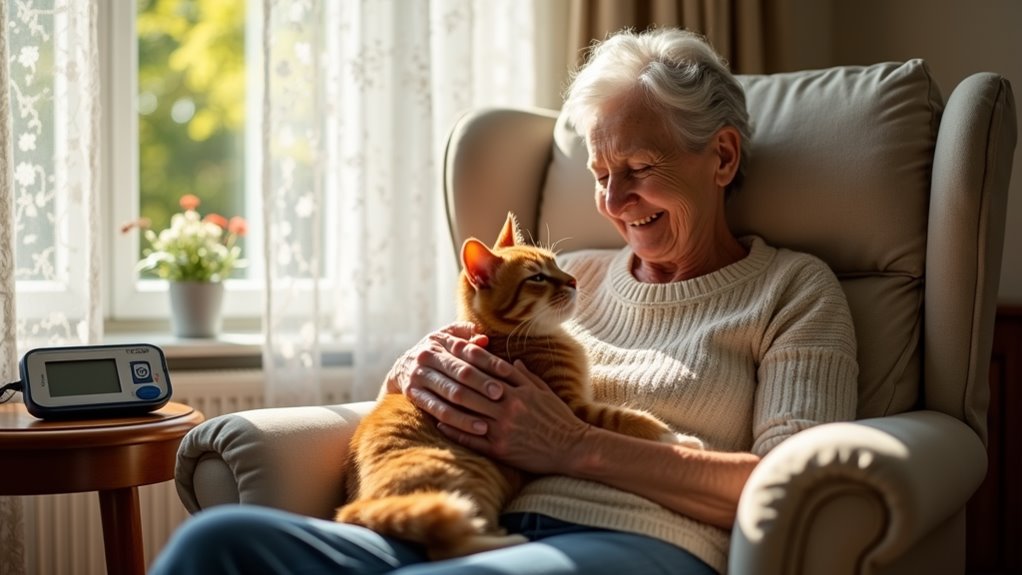Your pet's impact on your wellbeing goes far beyond cuddles and companionship. Research shows that having a furry friend can lower your blood pressure, reduce cholesterol levels, and strengthen your immune system. You'll experience decreased anxiety and depression while enjoying higher levels of feel-good hormones like serotonin and oxytocin. Pets also help you stay active through walks and playtime, while naturally creating opportunities for social connections with other pet owners. Whether through structured animal therapy or daily interactions, these faithful companions offer proven benefits for both your physical and mental health. Discover how these remarkable animals can transform your life's journey.
Key Takeaways
- Pet owners experience lower blood pressure, reduced cholesterol, and fewer doctor visits, indicating significant physical health benefits.
- Regular interaction with pets increases serotonin and oxytocin while decreasing cortisol, improving overall mental wellness.
- Animal-assisted therapy in healthcare settings helps patients achieve specific therapeutic goals and speeds recovery.
- Pets facilitate social connections through shared activities, community engagement, and conversations with other pet owners.
- Daily pet care responsibilities enhance personal growth through improved empathy, time management, and problem-solving skills.
Physical Health Benefits of Pets

While many people adopt pets primarily for companionship, research shows that having a furry friend can significantly boost your physical health. You'll likely become more active, as dogs need regular walks and playtime.
Even playing with cats can increase your daily movement and calorie burn.
Pet ownership can lower your blood pressure, reduce cholesterol levels, and decrease triglycerides. You'll experience fewer heart problems and have a better chance of surviving a heart attack if you do have one.
Having a pet also strengthens your immune system and reduces allergies, especially in children who grow up with pets.
Studies show that pet owners visit their doctors less frequently and use fewer medications than those without animal companions.
Pets and Mental Wellness
Although physical health benefits are significant, the mental wellness advantages of having a pet can be even more profound. You'll find that pets offer unconditional love and emotional support, helping reduce anxiety, depression, and feelings of loneliness.
They provide a sense of purpose and routine that can boost your mental stability and self-worth. Your furry friend can serve as a natural stress reliever, lowering cortisol levels while increasing beneficial hormones like serotonin and oxytocin.
When you're feeling down, your pet's presence can offer comfort without judgment. They're also excellent social catalysts, helping you connect with other pet owners and improving your interpersonal relationships.
If you're struggling with mental health challenges, you'll discover that caring for a pet can provide structure and meaning to your daily life.
Animal Therapy in Healthcare

Since healthcare providers have recognized the therapeutic value of animals, they've increasingly incorporated animal-assisted therapy into various medical settings.
You'll find therapy animals in hospitals, rehabilitation centers, nursing homes, and mental health facilities, where they help patients achieve specific treatment goals.
During your hospital stay, you might encounter a therapy dog that helps reduce your anxiety before procedures or assists with physical therapy exercises.
In rehabilitation settings, you can work with horses to improve balance and coordination.
Even cats provide therapeutic benefits, as their purring and gentle presence can lower your blood pressure and stress levels.
These animal-assisted interventions aren't just feel-good experiences – they're structured programs with measurable outcomes, helping you recover faster and cope better with medical challenges.
Social Connections Through Pet Ownership
When you own a pet, you'll discover they're natural social catalysts that create connections with other people. Your furry friend can spark conversations at the dog park, during neighborhood walks, or even through social media pet groups.
These interactions often develop into meaningful friendships with fellow pet owners who share your interests and values.
Your pet also helps strengthen existing family bonds. Walking the dog becomes a shared activity, while caring for any pet teaches children responsibility and empathy.
You'll find yourself spending more quality time at home, as pets encourage family members to gather and interact rather than retreat to separate spaces with their devices.
Even in today's digital world, pets continue to bring people together, fostering real-world relationships and community connections.
Pet Care and Personal Growth

Beyond fostering social connections, caring for a pet shapes your personal growth in profound ways.
You'll develop greater responsibility as you maintain feeding schedules, exercise routines, and veterinary appointments. This consistent caregiving builds discipline and time management skills that often transfer to other areas of your life.
Your pet's dependency on you cultivates empathy and emotional intelligence. You'll learn to read non-verbal cues, respond to another being's needs, and make decisions in their best interest.
This nurturing role can boost your self-esteem and sense of purpose, especially when you see the positive impact of your care.
Through pet ownership, you'll also strengthen your problem-solving abilities as you address behavioral challenges, health issues, and daily care logistics.
Frequently Asked Questions
How Much Does Pet Health Insurance Typically Cost per Month?
You'll typically pay between $20 to $50 per month for cat insurance and $30 to $70 for dog insurance, though costs can vary significantly.
Your monthly premium depends on factors like your pet's age, breed, location, and coverage level.
Exotic pets often cost more to insure.
You'll find cheaper rates if you insure your pet while they're young and healthy.
Can Landlords Legally Deny Housing to Service Animal Owners?
Life can throw you curveballs, but when it comes to service animals, you're protected by law.
Under the Fair Housing Act and Americans with Disabilities Act, landlords can't legally deny you housing because of your service animal. They must provide reasonable accommodation, even in "no-pet" properties.
You don't have to pay pet deposits or fees, though you're still responsible for any damage your service animal causes.
Which Pets Are Best Suited for People With Severe Allergies?
If you have severe allergies but want a pet, you'll find several hypoallergenic options.
Fish are ideal since they're contained in tanks and don't produce dander.
Reptiles like bearded dragons, snakes, and turtles also won't trigger allergies.
If you prefer furry companions, consider breeds like the Bichon Frise, Poodle, or Sphinx cat, which produce fewer allergens than other dogs and cats.
What Age Should Children Be Before Getting Their First Pet?
You'll want your children to be at least 5-6 years old before introducing their first pet, as they can better understand gentle handling and basic responsibilities at this age.
If you're considering small pets like hamsters or fish, age 7-8 might work well.
For dogs or cats, waiting until ages 9-12 ensures your child can help with feeding, walking, and general care while grasping the commitment involved.
How Do Pets From Different Species Learn to Coexist Peacefully?
You'll find that pets from different species can learn to coexist through gradual introduction and positive reinforcement.
Start by keeping them in separate spaces while they get used to each other's scents. Then, supervise short encounters, rewarding calm behavior.
Don't force interactions; let them set their own pace. Create separate safe spaces for each pet, and ensure they don't compete for resources like food, water, or attention.
Conclusion
Your furry friend is more than just a warm bundle of love – they're a lifeline to better health. Whether you're battling stress, seeking more exercise, or craving deeper social connections, pets open doors you never knew existed. As you nurture your animal companion, you'll find they're nurturing you right back. The pawprints they leave on your life create a path to improved physical and mental wellbeing.

Leave a Reply